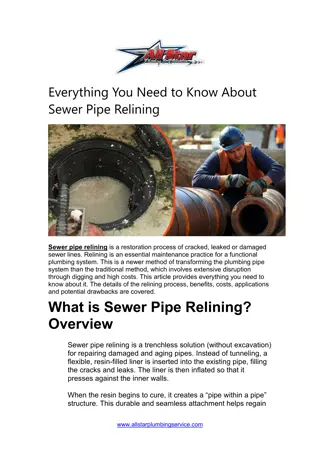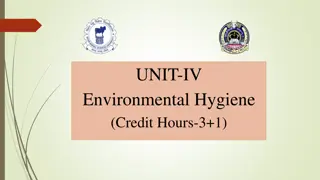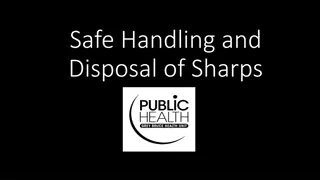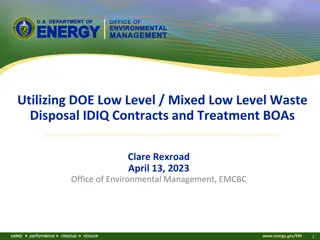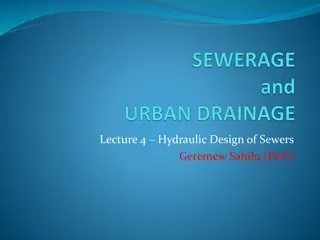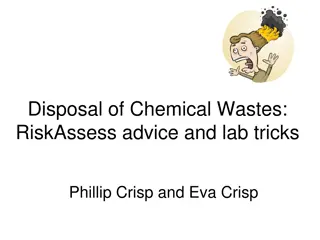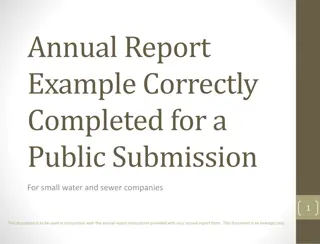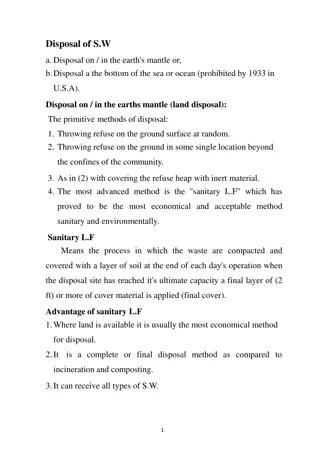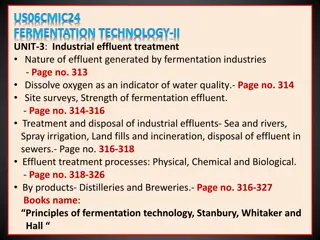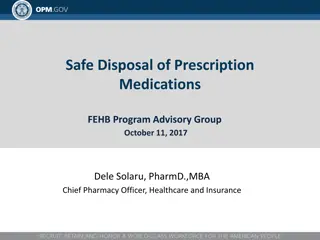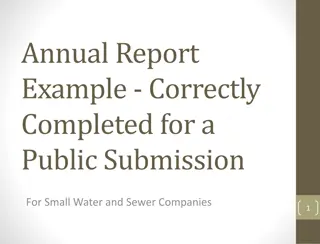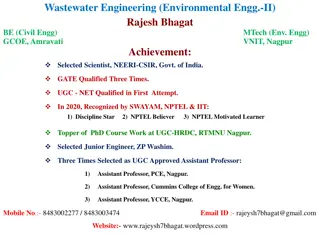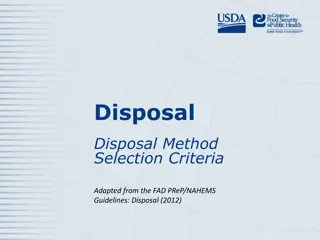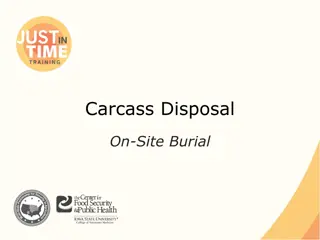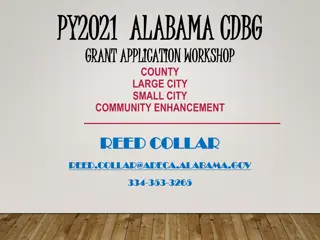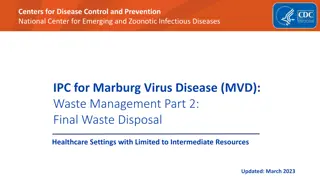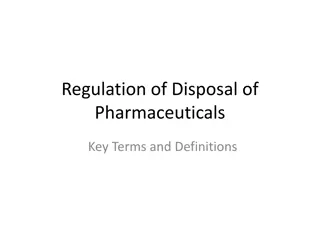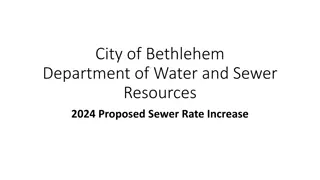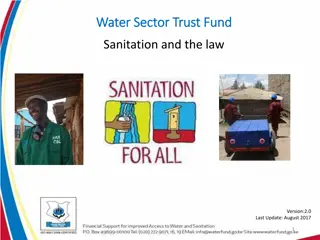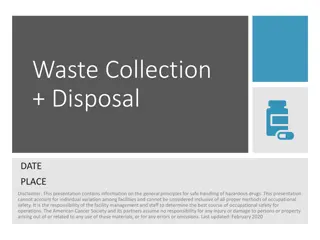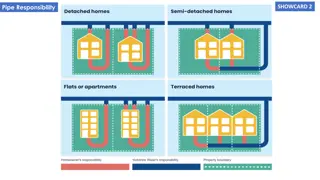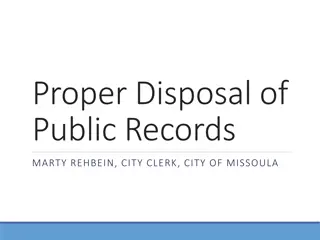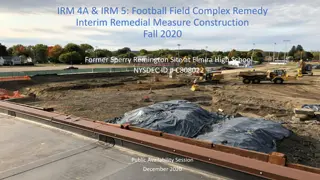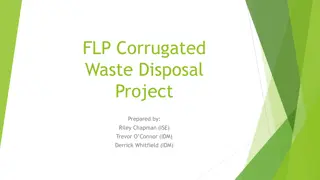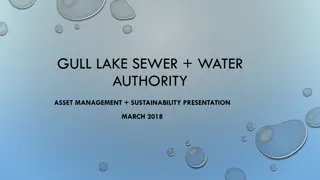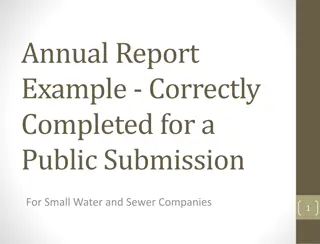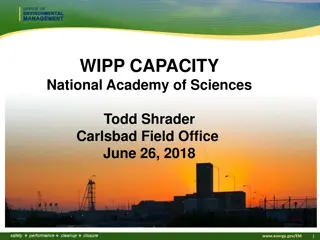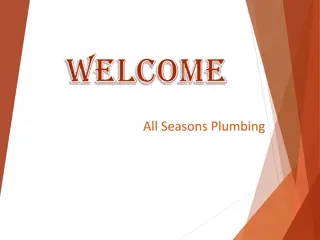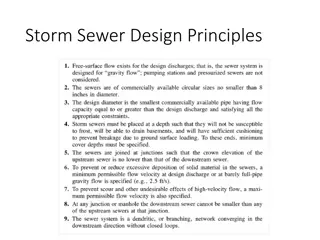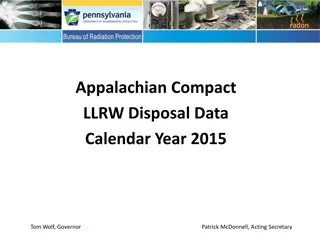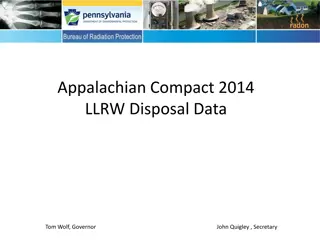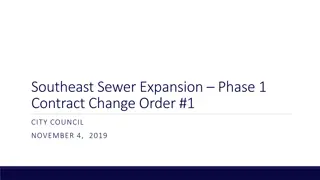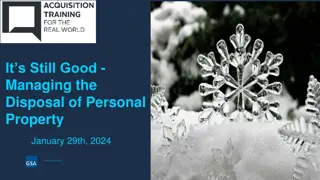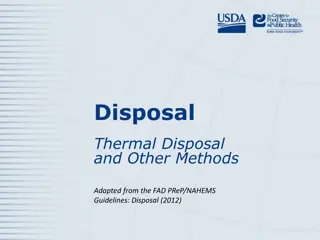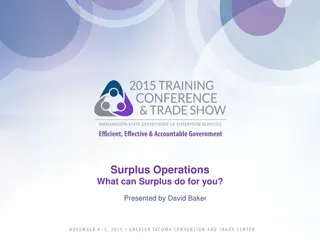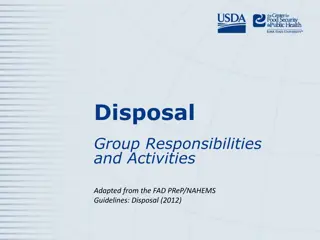Challenges in Sol Plaatje Local Municipality Water and Wastewater Management
Sol Plaatje Local Municipality is facing significant challenges with water and wastewater management, including sewer leaks, poor infrastructure maintenance, and environmental concerns. The Department of Water and Sanitation is working to address issues such as sewer spillages, water quality testing
0 views • 22 slides
Proposed Changes to Guam's Toilet Facilities and Sewer Disposal Act
Current controversies surrounding residential lot sizes, lack of flexibility in existing laws, and rising nitrate levels have prompted the introduction of Bill 175-37 (COR) in Guam. The bill aims to address shortcomings in existing regulations by allowing the development of 1/6 acre lots with Type 4
4 views • 10 slides
Navigating the Depths Storm Sewer Inspection Camera Insights in Walnut Creek
Cloggone Plumbing and Drain, a leading provider of professional plumbing and drain services in Walnut Creek, California, is proud to share its expertise in storm sewer inspection camera technology. This powerful tool, storm sewer inspection camera in Walnut Creek, allows us to delve deep into the un
2 views • 6 slides
Everything You Need to Know About Sewer Pipe Relining
Sewer pipe relining is a restoration process of cracked, leaked or damaged sewer lines. Relining is an essential maintenance practice for a functional plumbing system. This is a newer method of transforming the plumbing pipe system than the tradition
0 views • 7 slides
Ensuring Hygienic Disposal of Carcasses and Fallen Animals
Disposing of carcasses and fallen animals is a crucial responsibility for veterinarians to maintain environmental hygiene and prevent health risks. Improper disposal can lead to the spread of diseases and attract pests. Various methods, such as burial, cremation, and incineration, are used to ensure
0 views • 22 slides
Proper Handling and Disposal of Sharps - A Community Safety Concern
Improper disposal of sharps poses risks to public safety as it can lead to injuries from needles contaminated with blood-borne infections. This article emphasizes the importance of safe handling and disposal practices for sharps, including drug paraphernalia, to protect both individuals and the comm
0 views • 21 slides
Utilizing DOE Low-Level & Mixed Low-Level Waste Disposal Contracts
EMCBC manages disposal and treatment contracts for Low-Level Waste (LLW) & Mixed Low-Level Waste (MLLW). Eligible users include DOE offices, prime contractors, and subcontractors. Services cover various waste types including radioactive materials, sealed sources, and TSCA-regulated waste. Specific c
0 views • 19 slides
Understanding Hydraulic Design of Sewers: A Comprehensive Overview
Delve into the world of hydraulic design of sewers with expert Geremew Sahilu (PhD). Explore historical perspectives, principles of sanitation, sewage collection and conveyance, wastewater flow rates, sewer design, various appurtenances, pumps, natural wastewater disposal methods, treatments, and es
2 views • 44 slides
Proper Chemical Waste Disposal: Advice and Best Practices
Learn how to safely dispose of chemical wastes in compliance with local regulations. Follow expert advice on waste collection, avoid sewer and garbage disposal, and prioritize safety to minimize environmental harm. Training on responsible disposal practices is essential for creating a culture of sus
0 views • 18 slides
Guide for Completing Public Submission Annual Report for Small Water and Sewer Companies
This document provides an example of a correctly completed annual report for small water and sewer companies intended for public submission. It includes guidance on important aspects to remember, such as accurate data entry, page balancing, label requirements, metered customers inclusion, and verifi
0 views • 35 slides
Efficient Methods and Considerations for Solid Waste Disposal
Efficient methods for solid waste disposal include sanitary landfilling, which involves compacting waste and covering it with soil daily. Advantages of this method include economic viability and flexibility in waste disposal. However, challenges such as limited suitable land availability and potenti
0 views • 10 slides
Industrial Effluent Treatment in Fermentation Industries
Fermentation industries generate various types of effluent containing organic matter, solids, and other waste materials. With stricter regulations on waste disposal, efficient treatment methods are essential for controlled disposal. This includes physical, chemical, and biological processes to treat
0 views • 84 slides
Safe Disposal of Prescription Medications: Importance and Methods
Proper disposal of prescription medications is crucial to prevent harm to children, pets, and the environment. Safely dispose of unused medications to avoid accidental poisoning, misuse, and pollution of water sources. Methods include using authorized collectors, pharmacies, and take-back events, an
0 views • 5 slides
Sample Annual Report Submission Process for Small Water and Sewer Companies
Guidance on correctly completing and submitting annual reports for small water and sewer companies, including instructions, examples, and important reminders. The provided images and information cover key aspects such as report pages, cover page details, verification requirements, and how to ensure
0 views • 35 slides
Comprehensive Overview of Wastewater Engineering and Sewer Construction
This detailed content covers various aspects of wastewater engineering, including sewer appurtenances, construction, maintenance, and house drainage systems. It also delves into rainwater harvesting methods and provides references for further study. The procedure for laying sewers, from setting out
0 views • 58 slides
Addressing Sewer Rate Changes and Structural Remedies
City's sewer rate changes history and underfunding issues due to lack of cost centering, overburdening the general fund, and inadequate capital project funding. The methodology for rate review highlights the need for reflective rates to cover service costs. The current rate structure shows deficienc
0 views • 19 slides
Guidelines for Animal Disposal Methods
Environmental and biosecurity guidelines recommend various disposal methods such as composting, rendering, permitted landfill, unlined burial, fixed-facility incineration, and open-air burning. Each method has specific selection criteria and considerations to minimize risks to the environment and bi
0 views • 17 slides
On-Site Burial for Carcass Disposal: Methods and Environmental Impacts
Explore the process of carcass disposal through on-site burial, covering topics such as trench burial, site selection, construction and design considerations, environmental impacts, and a comparison with other disposal methods. Learn about key factors influencing on-site burial, including soil prope
0 views • 13 slides
Alabama CDBG Grant Application Workshop Considerations and Criteria
Considerations and criteria for rating competitive grant applications in Alabama Community Development Block Grant (CDBG) program include adequacy of water and sewer rates, operations and maintenance capacity, local participation ability, capacity to implement CDBG projects, distress factors, cost e
0 views • 12 slides
Proper Waste Disposal in Healthcare Settings for Marburg Virus Disease
In healthcare settings, proper waste disposal is crucial during outbreaks like Marburg virus disease to prevent health risks for patients, staff, and the community. This involves incineration or non-burn treatment of infectious waste before disposal, emphasizing the importance of appropriate waste m
0 views • 16 slides
Regulations and Disposal of Pharmaceuticals Key Terms
Understanding the regulations around the disposal of pharmaceuticals is crucial to protect the environment and ensure safe practices. Unwanted pharmaceuticals should not be disposed of with regular trash or flushed as they can affect water resources. Incineration, governed by federal Clean Air Act r
0 views • 7 slides
City of Bethlehem Department of Water and Sewer - 2024 Proposed Sewer Rate Increase and Fund Overview
Bethlehem's Sewer System, managed by the City's Department of Water and Sewer, includes a Wastewater Treatment Plant, collection systems, and agreements with tributary municipalities. Sewer billing is done directly for City and Hanover Township customers, with rates set by ordinance. Tributaries are
0 views • 10 slides
Waste Disposal Regulations and Guidelines for Sanitation
Guidelines for waste disposal and sanitation laws under the Public Health Act are outlined, including definitions of nuisances, prohibitions, penalties, and training programs for sanitation teams. Failure to comply with regulations can result in fines. Proper waste handling and disposal are essentia
0 views • 8 slides
Proper Handling and Disposal of Hazardous Drugs and Waste
Guidelines for the safe handling and disposal of hazardous drugs and waste in healthcare facilities. The content covers training modules, waste collection, sources of healthcare waste, disposal methods, and legal regulations related to the disposal of hazardous drugs. Various types of healthcare was
0 views • 21 slides
Managing Sewer Flood Scenarios: Impacts and Recovery
Addressing various sewer flooding scenarios in different settings such as households, businesses, care homes, schools, and outdoor areas. The consequences of sewer floods are explored, including property damage, displacement, and business closures. Measures taken to dry and repair affected areas are
0 views • 8 slides
Proper Disposal of Public Records Guidelines in Montana
Guidelines for proper management and disposal of public records in local government entities in Montana, outlined under HB 123 passed in 2015. The Local Government Records Committee (LGRC) oversees records retention schedules and reviews disposal requests. Contact LGRC for questions or assistance re
0 views • 24 slides
Football Field Complex Remedy Project Overview
The project involves remedial measures for the football field complex at Elmira High School, focusing on soil removal, groundwater monitoring, and vapor intrusion prevention. Excavation, disposal of hazardous waste, and construction of institutional controls are key components. Plans for interim rem
0 views • 15 slides
FLP Corrugated Waste Disposal Project Overview
This project aims to improve the efficiency and cost-effectiveness of the current corrugated waste disposal process. By implementing alternative designs and reengineering processes, the goal is to increase labor efficiency by 10%, reduce waste disposal costs by 10%, and provide recommendations for s
0 views • 8 slides
Gull Lake Sewer & Water Authority Overview
Gull Lake Sewer & Water Authority, established in 1980, serves over 2400 customers in Kalamazoo and Barry counties, Michigan. They manage a network of sewers, pumping stations, and force mains, providing system maintenance and upgrades. The authority plans for asset management and sustainability, wi
0 views • 14 slides
Comprehensive Guide for Completing Annual Reports for Small Water and Sewer Companies
Learn how to correctly complete a public submission annual report for small water and sewer companies using the Excel version. This guide provides detailed instructions and examples for accurately filling out the report, ensuring accuracy and compliance with regulations.
0 views • 35 slides
WIPP Waste Disposal Capacity Overview
The Waste Isolation Pilot Plant (WIPP) has a statutory capacity of up to 175,565 cubic meters for disposal of transuranic waste. As of June 2018, 93,500 cubic meters of TRU waste have been emplaced at WIPP. The facility operates within the 16 square mile land withdrawal boundary specified by the WIP
0 views • 8 slides
If you are looking for Sewer Stoppage Service in Grand Central District
If you are looking for Sewer Stoppage Service in Grand Central District, All Seasons Plumbing is a family-owned and operated company specializing in solving your plumbing problems quickly and efficiently. Our company is dedicated to serving our custo
0 views • 6 slides
Storm Sewer Design Principles and Rational Method for Composite Areas
Explore storm sewer design principles, including inlet time and flow time considerations. Learn about the rational method for composite areas with practical examples to enhance understanding.
0 views • 5 slides
Disposal Data of Appalachian Compact LLRW 2015
The data from the Appalachian Compact LLRW disposal activities in the year 2015 includes information on disposed volume and activity by state and facility type. Figures show cubic feet and curies disposed, detailing academic, government, industry, medical, and utility sectors. The disposal sites wer
0 views • 12 slides
Appalachian Compact 2014 LLRW Disposal Data Analysis
This data analysis showcases the disposed low-level radioactive waste (LLRW) volumes, activities, and trends as part of the Appalachian Compact in 2014. It provides insights into LLRW disposal by state, facility type, and activity levels, covering academic, government, industry, medical, and utility
0 views • 10 slides
Southeast Sewer Expansion Phase 1 Contract Changes Overview
City Council awarded the original contract for the Southeast Sewer Expansion Phase 1 to S.J. Louis Construction of Texas, LTD. The project aims to address the need for sewer in the southeast portion of the City, critical for future development projects and long-term infrastructure needs. Constructio
0 views • 8 slides
Proper Management of Personal Property Disposal Process
Explore the steps involved in managing the disposal of personal property efficiently, including internal screening, excess screening, and utilizing resources like PPMS and NUOs. Learn about the various methods of disposal such as transfer, donation, and public auction. Discover how to identify if yo
0 views • 47 slides
Thermal Disposal Methods for Animal Carcasses: Guidelines and Best Practices
Explore thermal disposal methods adapted from the FAD PReP/NAHEMS Guidelines for effectively managing animal carcasses. Learn about high-temperature combustion, fixed-facility incineration, open-air burning risks, and air-curtain incineration techniques. These methods vary in efficiency, environment
0 views • 17 slides
Surplus Operations: How We Help Agencies Manage Property Efficiently
Surplus Operations, presented by David Baker, offers property management services to agencies including state and local governments, municipalities, school districts, and non-profits. Their mission is to recover, reuse, or recycle property to avoid disposal, saving money for agency partners. Service
0 views • 34 slides
Guidelines for Disposal Group Responsibilities and Activities
Responsibilities and activities of the disposal group adapted from FAD PReP/NAHEMS guidelines include roles such as disposal method recommendations, organizing and directing activities, ensuring procedures are carried out, and performing disposal tasks. The group aims to mitigate pathogen spread, sa
0 views • 16 slides



